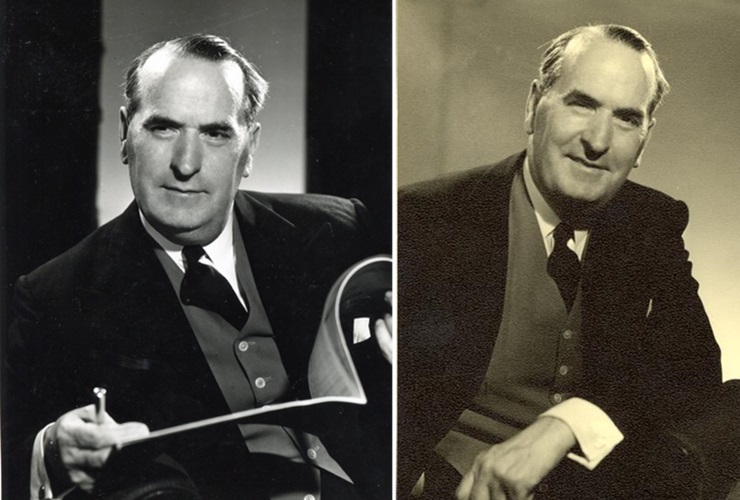
28: Frank Wright MBE (1901 – 1970)
Frank Wright was a dominant presence in the post war brass banding world – figurately as well as musically.
Ambition brought him a long way - over 10,000 miles from the small township of Smeaton about 25 miles north of Ballarat in the state of Victoria, to the Royal Albert Hall in London, where his name was synonymous with the National Championships of Great Britain for well over 20 years.
Arrogance played its part too. He arrived in England in 1933 after telling his sister Laura that Australia wasn’t “big enough” for him.
There was little doubt he had talent – and he knew it.
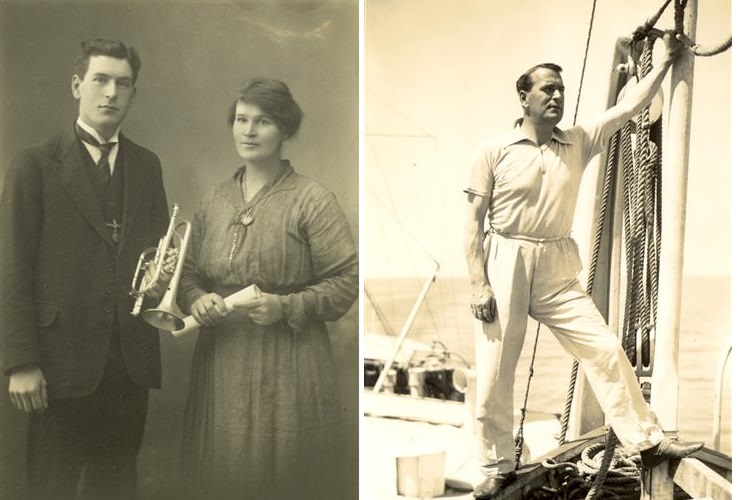
Frank Wright with his younger sister Laura and as a flambouyant youth
Complexities
It did though come at a cost - his complexities clearly defined, tempered and aired. Contemporaries variously recalled him as gregarious, loyal and driven, a man “constantly seeking perfection” - others as distant and overbearing, “a nasty man” with “a nasty way of doing things”.
Contemporaries variously recalled him as gregarious, loyal and driven, a man “constantly seeking perfection” - others as distant and overbearing, “a nasty man” with “a nasty way of doing things”.
Frank Joseph Henry Wright was born in 1901 into a musical family. His father, William was a foreman at a Ballarat gold mine, whilst his mother, Sarah kept their modest home. Elder brother Alex was a successful opera and comedy singer, his sister, Lydia an accomplished violinist.
As the youngest son, Frank was both precocious as well as spoilt in his encouragement to embrace music. Ballarat Library researcher Katrine Kelly later wrote: “Frank was never permitted to do any menial tasks about the home and spent eight to 10 hours a day at his music.”
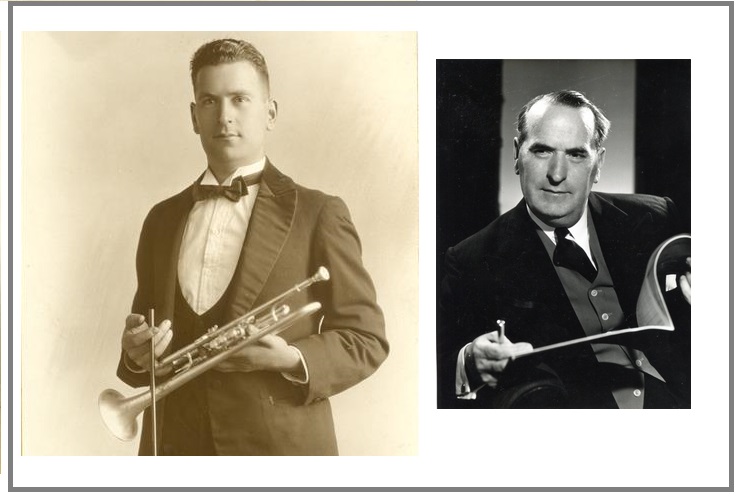
Pupil and master - as young player/conductor and as a conductor/composer
Code to success
He was taught piano, orchestration and composition, but it was the legendary Percy Code who gave him cornet lessons. He was later to give the premier Code’s iconic solo ‘Zelda’ before it was published.
“In Frank Wright the Ballarat district has produced a cornet player of outstanding gifts and unlimited possibilities.
By the time Wright was 19 he had also matched Code’s achievement of winning the Australian Cornet Championship - against 52 competitors.
The local newspaper wrote: “In Frank Wright the Ballarat district has produced a cornet player of outstanding gifts and unlimited possibilities. This youth, who resides at Smeaton, defeated the cream of players from Australia’s leading bands…”
No finer player
It was during this period that James Ord Hume, on a visit to Australia and hearing him perform, remarked: “I have heard no finer player in England.”
It was during this period that James Ord Hume, on a visit to Australia and hearing him perform, remarked: “I have heard no finer player in England.”
Wright later went on to succeed Code as conductor of the City of Ballarat Municipal Band, soon making his mark with the baton, although his connection with local rivals Ballarat Soldiers Band eventually saw him leave amid acrimony.
Meanwhile his musical skills were further honed by playing trumpet in Melbourne cinemas as well as being engaged as musical director of the Coliseum Pictures at Ballarat to provide the music to the silent movies of the time. It was to prove a foundation stone on which his future was built.
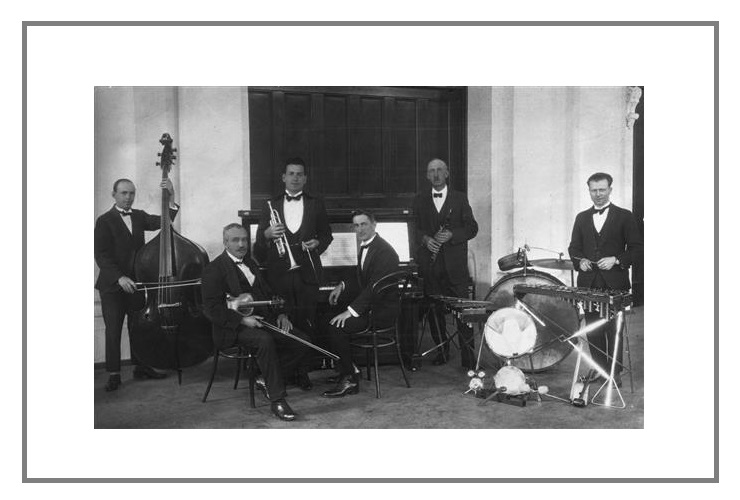
Leading the music at Ballarat cinemas
Move to England
England and its powerful banding culture was still a dream though, and it was not until his beloved mother’s death in 1932 (his father died four years later) and following a period of extended mourning, that he left Australia’s shores.
Her passing had eroded the flamboyance of his youth, replaced by a seriousness of purpose magnified by the manner of a departure that included farewell functions over three weeks and a send-off on 5th August 1933 from the railway station by Ballarat Soldiers Band.
Steely resolve
What awaited him in England remains a matter of debate – although by the time he had visited the 1933 Crystal Palace National Championship his ability to make connections with people of influence included the businessman Jimmy Southern who ran the professional St Hilda’s Colliery Band.
It was an experience that added a steely resolve to his reputation as a musician as well as a man.
He was soon appointed to conduct them on its 1934 summer tour, directing around 300 performances. It was an experience that added a steely resolve to his reputation as a musician as well as a man.
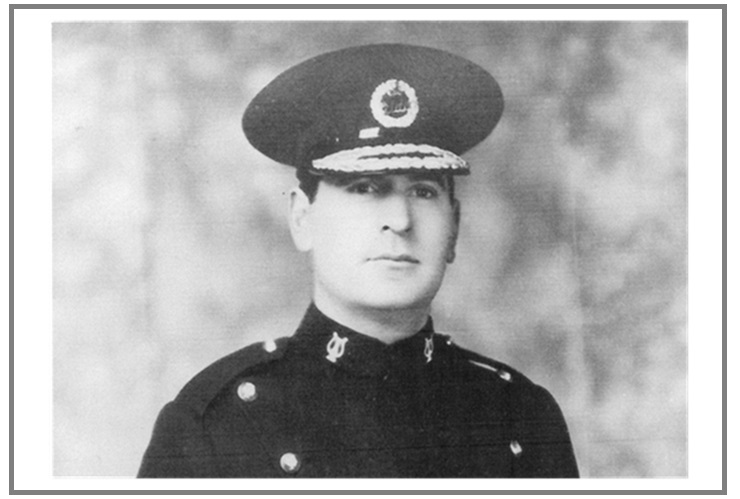
As conductor of St Hilda's Band
Bloody somersaults
Trombone player Bill Blackett later recalled that Wright, “certainly got the band to play the way he wanted”, but that he was “a nasty man, (who) had a nasty way of doing things sometimes”.
Wright had sarcastically inquired of Blackett before he played the solo ‘The Firefly’, “How many bloody somersaults do you do in this one?”
Wright had sarcastically inquired of Blackett before he played the solo ‘The Firefly’, “How many bloody somersaults do you do in this one?”
Afterwards he coldly demanded, “Never play that again – never!”
The episode was not lost on Southern, who despite revealing that he helped get Wright the plumb job of Music Director of the London Parks, told him that he would rather sack Wright than the player. After the tour ended, he wasn’t asked back.
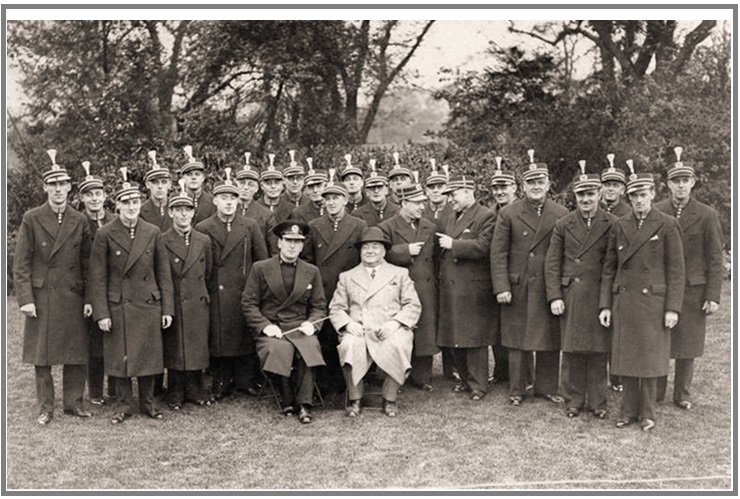
Sat next to Charlie Southern and St Hlda's Band
Made for the job
Undeterred, Wright took up his appointment as Music Director (Parks Department) in January 1935. He had described himself on his CV as “an arranger and composer for R Smith and Co. and for Joshua Duckworth Ltd., holding degrees of L.A.B., R.A.M and R.C.M. and winner of a special prize in Victoria, Australia”.
His temperament was made for the job – one which he held for over 25 years. He organised around 1600 concerts of various sorts each year.
On his award of the MBE in 1966 he openly spoke of it as an honour for the Parks Department.
His professionalism, desire to succeed and musical authority made a huge impression – his finest achievement (following a visit to the Hollywood Bowl in 1951) the introduction of lakeside symphony concerts at Kenwood with conductors such as Barbirolli, Boult and Schwarz.
“Not so grandiose as Hollywood with its 20,000 seats”, he said, “but infinitely more beautiful and quieter”. He followed this success by introducing concerts at Holland Park in 1955 and at the Crystal Palace Bowl in 1961.
MBE
Bands played a big part too with weeklong engagements in parks for several works bands as well as weekend concerts for local bands. The Victoria Embankment Gardens bandstand was constructed during Wright’s tenure, and it was under his guidance that it became a centre for brass and military band music.
On his award of the MBE in 1966 he openly spoke of it as an honour for the Parks Department.
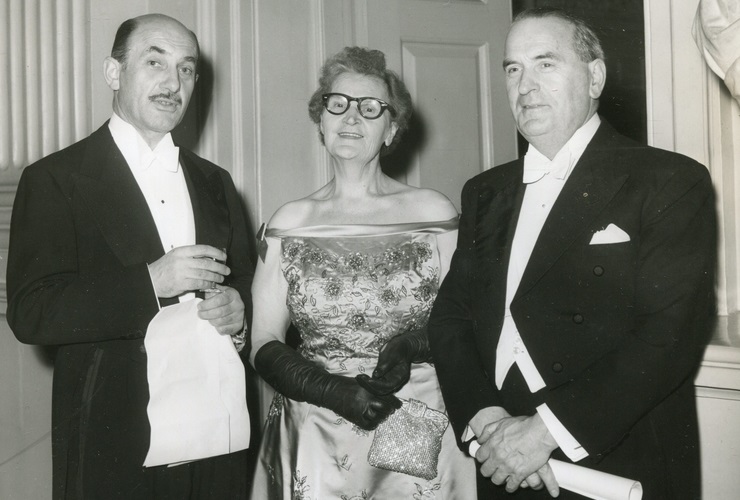
British establishment: With his sister Laura at a function in London
Bittersweet
Frank Wright continued playing the cornet until 1945, his last fling with Foden’s Motor Works for an ENSA tour in France in May 1945, when Harry Mortimer, who was to become a close friend, later recalled, “he sat in the top cornet rank. In fact, we celebrated VE Night together in Brussels.”
It would be a bittersweet celebration - his brother Alex killed in an air-raid whilst performing in London’s West End in 1941. Wright had just seen him perform earlier that week.
It would be a bittersweet celebration - his brother Alex killed in an air-raid whilst performing in London’s West End in 1941. Wright had just seen him perform earlier that week.
Understandably perhaps, from then on work took over his life.
The post-war brass band landscape offered great opportunities for someone with a keen eye for musical business, although his deep seated complexities made him a figure of respect rather than admiration.
Appointments
A string of appointments came his way; from Professor of Brass and Military Band Conducting & Scoring at the Guildhall School of Music to editor of ‘The Conductor’ magazine, and military and brass band advisor to the 1951 Festival of Britain.
He also took considerable time to help a young Ken Smith – the prodigious New Zealand cornet player who later recalled that Wright had been, “a wonderful friend to me, initially paving the way for my arriving on the shore of England in 1950. The encouragement in those years was unforgettable, as was the warmth of fellowship”.
Wright was to use Smith as the soloist on the iconic tutorial record ‘The Voice of the Cornet’ comprising 47 studies which Wright wrote together with the script, read by Harry Mortimer.
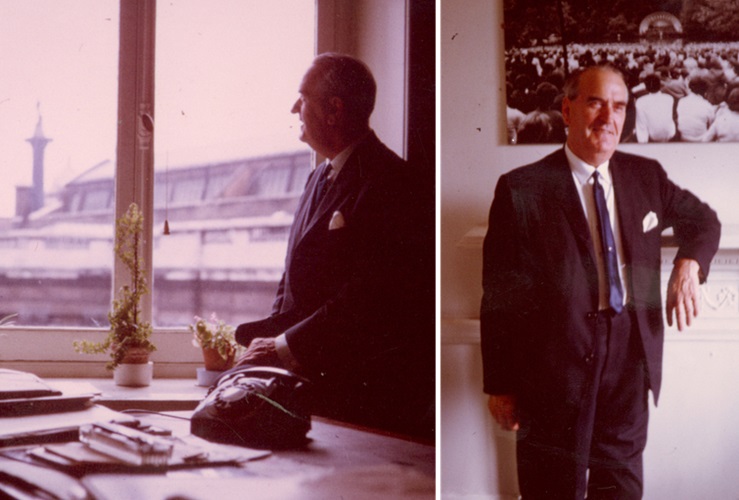
At work as Music Director (Parks Department) of London GLC
Talents
Frank Wright’s talents as an insightful composer and skilful arranger had not gone unnoticed either. He was to eventually score over 100 works, many published by Boosey & Hawkes where he was music editor from 1946.
However, it was the link made with Edwin Vaughan Morris, the administrator for the National Brass Band Championships from 1945 - 1971, that provided with what was described as “an apt and nationwide means” to “exploit natural qualities of musicianship.”
These were famously realised through a series of Championship Section orchestral arrangements used at the Royal Albert Hall over the following years – starting in 1952 with Bantock’s ‘The Frogs of Aristophanes’.
These were famously realised through a series of Championship Section orchestral arrangements used at the Royal Albert Hall over the following years – starting in 1952 with Bantock’s ‘The Frogs of Aristophanes’.
Important span
Writing about his contribution, author Paul Hindmarsh said: “During the fallow decades after the Second World War, the test-piece transcriptions of Frank Wright opened new technical horizons. His method of setting a new technical challenge was to leave out as little of the original information as possible.
The choice of work was also crucial, and his inclination was towards an orchestral showpiece, or an overture with powerful dramatic effects”.
The choice of work was also crucial, and his inclination was towards an orchestral showpiece, or an overture with powerful dramatic effects”.
Wright’s contribution provided an important span of interest for a medium fast becoming locked in dated creativity - an intriguing axel point for the counterbalances that at one end came Eric Ball’s melodic conservatism and the other Vinter’s emerging experimentation.
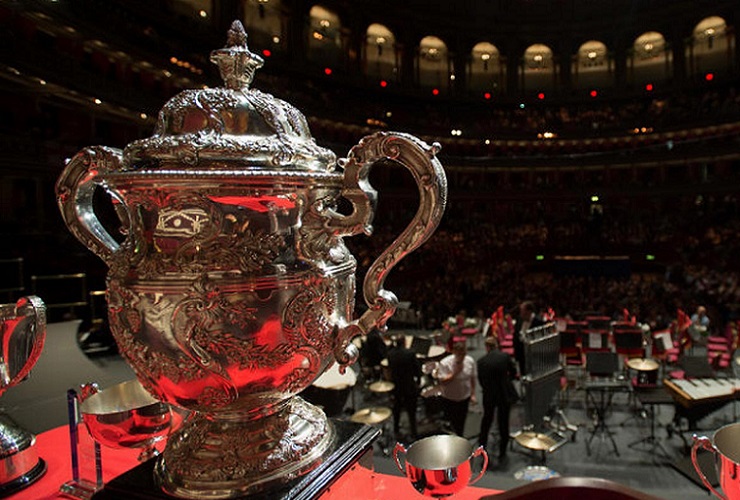
Wright decided the destination of the most famous banding trophy on 16 occassions at the Royal Albert Hall
Skilful
‘The Frogs’ was followed at the Royal Albert Hall by ‘Diadem of Gold’ (1953); ‘Sovereign Heritage’ (1954); ‘Le Roi d’Y’s’ (1959); ‘Les Francs Juges' (1961); ‘The Force of Destiny’ (1962); ‘Le Carnival Romain’ (1966) and ‘The Mastersingers’ (1968). ‘Benvenuto Cellini’ was used at the World Championship in 1970.
In addition, he also offered a skilful amanuensis to composers who lacked experience of scoring for brass band,
In addition, he also offered a skilful amanuensis to composers who lacked experience of scoring for brass band, such as Edric Cundell (‘Blackfriars’, 1955), Edmund Rubbra (‘Variations on the Shining River’, 1958) and William Alwyn (‘The Moor of Venice’ – used as an Area test-piece in 1958).
He was also respected enough to score the second brass band works of Herbert Howells (‘Three Figures’, 1960) and Sir Arthur Bliss (‘The Belmont Variations’, 1963).
Warm gratitude
In the 1960 National Final programme Herbert Howells wrote: “It is equally fitting that I should express warm gratitude and indebtedness to Frank Wright. His brilliance as an arranger of my own and many other works is widely known”.
“It is equally fitting that I should express warm gratitude and indebtedness to Frank Wright. His brilliance as an arranger of my own and many other works is widely known”.
Elsewhere he arranged rather than composed prolifically – his test-piece work ‘Sirius’ written in 1949 was dedicated to his younger sister Laura, whilst his epically proportioned transcription of Dr Thomas Woods’ ‘The Rainbow’, commemorating the evacuation of Dunkirk in the Second World War was conducted at its premiere by Sir Adrian Boult and involved a soloist, choirs and three brass bands.
Pomp and splendour
Wright’s small output of original music is now largely forgotten, although his skilled treatment of lightweight classical repertoire made it standard concert fayre for decades after his death.
With little to return to in Australia (he returned just once after leaving in 1933), London became his home, his love of its pomp and splendour shown in two of his smaller works, ‘The Old Westminster Suite’ and the ‘Grand March – Whitehall’.
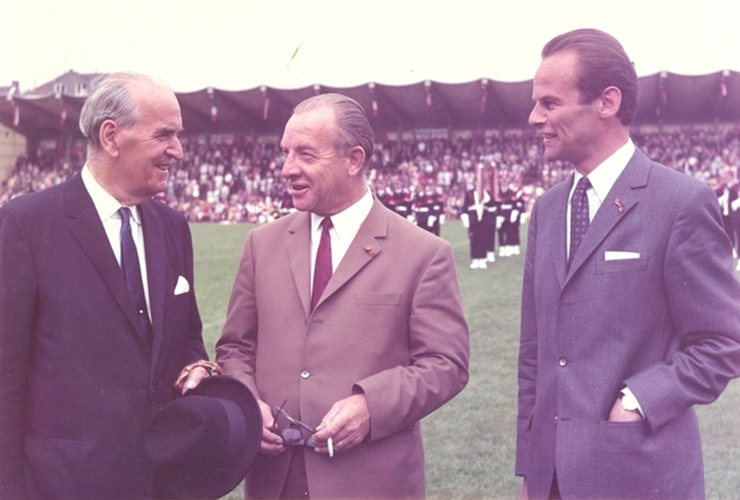
Wright judged around the world - on this occassion in Kerkrade in 1966
Adjudicator
As an adjudicator, Frank Wright was indefatigable – judging at the National Championships at the Royal Albert Hall on 16 occasions. He also judged at the Crystal Palace National Championship on four occasions before the Second World War, as well as the British Open on numerous occasions up to 1959. In total he was in the box well over 400 times – from Dunedin to Edinburgh.
Edwin Vaughan Morris, another man of complexities, described him as being, “single minded in determining that the best overall performance was accorded the honours. He had an obsession in this context.”
Edwin Vaughan Morris, another man of complexities, described him as being, “single minded in determining that the best overall performance was accorded the honours. He had an obsession in this context.”
He added that whilst odd wrong notes or other mishap were pinpointed, they were “weighed against the standard of the overall performance in analysing the points he awarded. Not for him a ‘kick in the teeth’ for a performer whom merit and consistency was supreme in the exercise concerned.”
He knew
Geoffrey Brand added: “When Frank Wright was in the ‘box’ you knew that ‘he knew’”.
Eventually ill health – perhaps brought on by his immense workload caught up with him.
Shortly before his passing on 16th November 1970, Frank Wright was installed as Master of the Worshipful Company of Musicians. So determined was he to accept the position that he was installed in the role at his home.
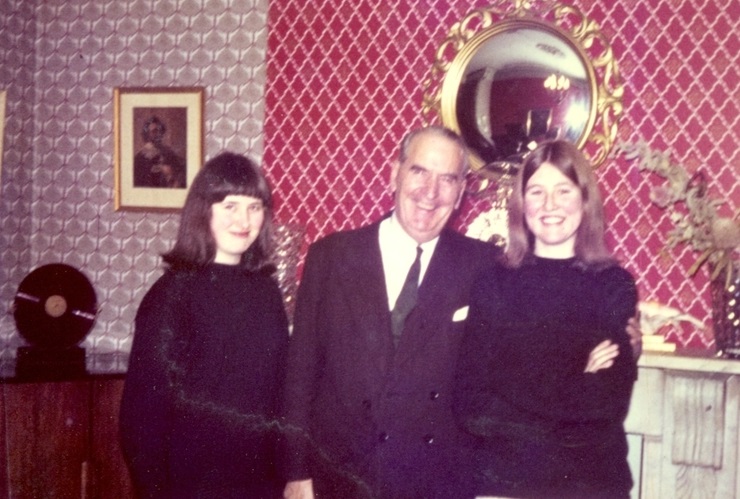
A gregarious host - at home with visitors in the late 1960s
He never married, but instead helped to establish the Maidie Lewis ‘Young Artists’ Fund and was an examiner and compiler for Trinity College of Music.
Following his death he left a perpetual endowment to the Worshipful Company of Musicians for the singing of Grace at its summer banquet and installation dinner. A Frank Wright Medal was also presented at the Royal South Street band competition in Ballarat for many years.
Obituaries
The obituaries were warm and respectful. Vaughan Morris perhaps pinpointed his character most accurately in saying, “his acquaintances were legion, his intimates few in number”.
Eric Ball said, “there was hidden in him a humility which not many realised”, whilst rather cryptically adding, “and if there are personal discords still unresolved, we pray that these may now disperse as the mist on a sunny morning.”
Eric Ball said, “there was hidden in him a humility which not many realised”, whilst rather cryptically adding, “and if there are personal discords still unresolved, we pray that these may now disperse as the mist on a sunny morning.”
Final word
The final word on a life of rich musical achievement was left to another giant of the post war banding world, Harry Mortimer.
“Looking back I can see the small bandstand in his home town of Ballarat where he played as a young man - a far cry from the Royal Albert Hall platform where he appeared so many times.
Although he was Australian by birth, and all Australians are proud of his fine record, I am sure he would also like us to regard him as a naturalised Londoner, a city to which he gave so much and which, in return, gave Frank Wright his final honour as Master of the Worshipful Company of Musicians.”
His funeral service was at Golders Green Crematorium, with a later Memorial Service held at The Church of the Holy Sepulchre in Holborn on 10th December 1970.
Tim Mutum
(Images are copyrighted by Victorian Collections held by the State of Victoria and cannot be reproduced. They are used by 4BR under Fair Dealing conditions)
4BR Hall of Fame: No.1: Jack Atherton
https://www.4barsrest.com/articles/2019/1832.asp
4BR Hall of Fame: No.2: Albert Baile
https://www.4barsrest.com/articles/2019/1836.asp
4BR Hall of Fame: No.3: Stanley Boddington
https://www.4barsrest.com/articles/2019/1842.asp
4BR Hall of Fame: No.4: Bram Gay
https://www.4barsrest.com/articles/2020/1848.asp
4BR Hall of Fame: No.5: Leonard Lamb
https://www.4barsrest.com/articles/2020/1855.asp
4BR Hall of Fame: No.6: Arthur Stender
https://www.4barsrest.com/articles/2020/1866.asp
4BR Hall of Fame: No.7: Violet Brand
https://www.4barsrest.com/articles/2020/1871.asp
4BR Hall of Fame: No.8: Eric Bravington
https://www.4barsrest.com/articles/2020/1875.asp
4BR Hall of Fame: No.9: Norman Ashcroft
https://www.4barsrest.com/articles/2020/1879.asp
4BR Hall of Fame: No.10: Albert Chappell
https://www.4barsrest.com/articles/2020/1884.asp
4BR Hall of Fame: No.11: Betty Anderson
https://www.4barsrest.com/articles/2020/1889.asp
4BR Hall of Fame: No.12: Trevor Walmsley DFC
https://www.4barsrest.com/articles/2020/1897.asp
4BR Hall of Fame: No.13: Percy Code
https://www.4barsrest.com/articles/2020/1903.asp
4BR Hall of Fame: No.14: George Thompson MBE
https://www.4barsrest.com/articles/2020/1909.asp
4BR Hall of Fame: No.15: Willie Lang
https://www.4barsrest.com/articles/2020/1914.asp
4BR Hall of Fame: No.16: James Scott
https://www.4barsrest.com/articles/2021/1916.asp
4BR Hall of Fame: No.17: Jack Mackintosh
https://www.4barsrest.com/articles/2021/1922.asp
4BR Hall of Fame: No.18: Teddy Gray
https://www.4barsrest.com/articles/2021/1928.asp
4BR Hall of Fame: No.19: Rowland Jones
https://www.4barsrest.com/articles/2021/1932.asp
4BR Hall of Fame: No.20: Helen Perkin
https://www.4barsrest.com/articles/2021/1944.asp
4BR Hall of Fame: No.21: Lt Col Cecil H Jaeger OBE
https://www.4barsrest.com/articles/2021/1954.asp
4BR Hall of Fame: No.22: Alex Mortimer
https://www.4barsrest.com/articles/2021/1966.asp
4BR Hall of Fame: No.23: Henry Geehl
https://4barsrest.com/articles/2022/1987.asp
4BR Hall of Fame: No.24: Geoffrey Brand
https://www.4barsrest.com/articles/2023/1996.asp
4BR Hall of Fame: No.25: Maurice Murphy
https://www.4barsrest.com/articles/2023/2002.asp
4BR Hall of Fame: No.26: Arthur Butterworth
https://www.4barsrest.com/articles/2023/2011.asp
4BR Hall of Fame: No.27: Gordon Langford
https://www.4barsrest.com/articles/2023/2015.asp











